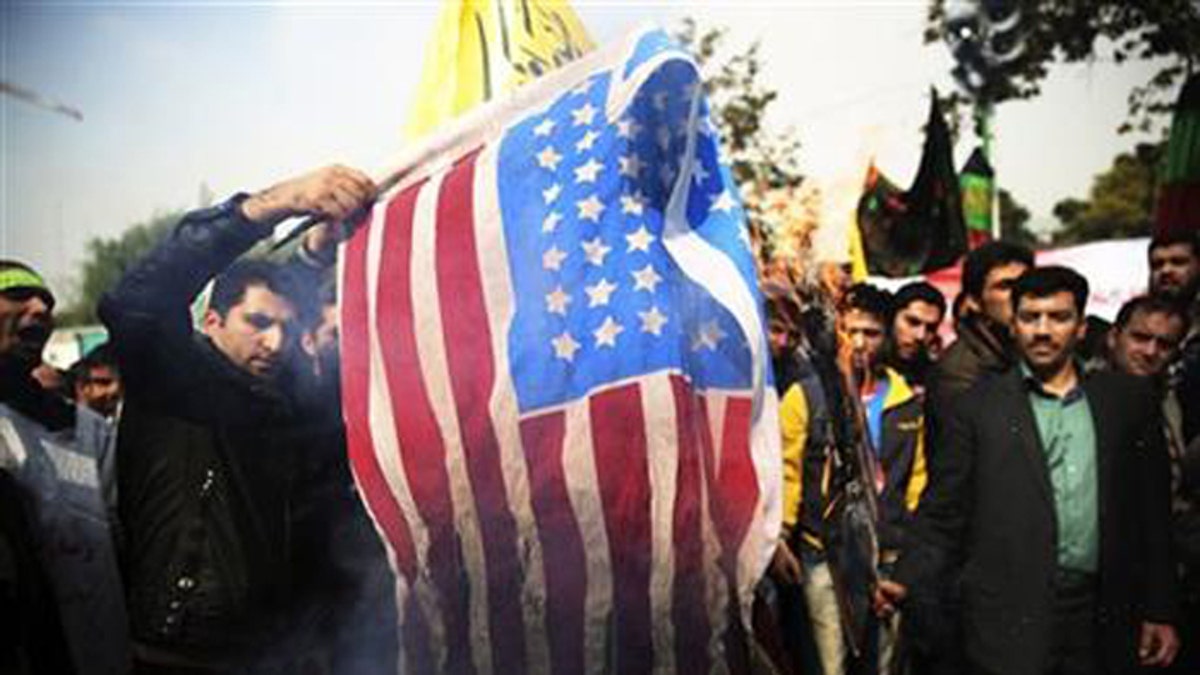
Sanctions on Iran are causing economic hardship, but may be making strapped Iranians angrier with the Us> than their own leaders. (AP)
Crippling sanctions imposed by the west have taken Iran’s economy from gradual recession to all-out freefall, and the people are feeling it in the form of skyrocketing food prices that have all but taken meat off their tables.
As lawmakers and the Obama administration debate further tightening the vise amid nuclear negotiations with the Iranian regime, it’s the people of Iran that are carrying the burden of economic hardship in every aspect of daily life. Several interviewed by FoxNews.com said runaway inflation is threatening to put food and medicine out of their reach.
[pullquote]
“People are suffocating under the sanctions,” said Marjan S., who spoke from Tehran. “The cost of rent in Tehran and in big cities have skyrocketed, and the price of meat and basic food items are increasing almost every single day.”
For many Iranians, the high cost of food items have forced them to become ‘involuntary vegetarians,” as they cannot afford meat or poultry for their families. All Iranian residents who spoke to FoxNews.com did so under the condition their full names would not be disclosed, for fear of retribution from the government.
But while it is well known that Iran’s economy is in shambles, with inflation at 36 percent, up 11.4 percent from last year, according to the Tehran Times, residents explained how the statistics are playing out over kitchen tables.
“Critical pharmaceuticals are scarce and even drugs that are manufactured here in our country can’t be found because certain ingredients are imported,” according to Doctor M. who works in a hospital outside Tehran.
“In order to work around the sanctions, the government has resorted to dangerous moves, such as importing medicine from countries such as China and India, putting our people more at risk,” he said.
According to the health ministry, state-run hospitals are becoming bankrupt resulting in a middle class that cannot afford to pay cash for medical services.
“The psychological profile of Iranians is affected as well,” according to Dr. M.
Some observers believe Iran’s more moderate posture since the election of President Hasan Rouhani and the regime’s willingness to enter into talks shows the west’s sanctions have worked. But the Obama administration has indicated it may move to ease up sanctions in exchange for a m eaningful turn in Iran’s pursuit of nuclear weapons.
The State Department backed up the Obama administration’s call for at the very least, a “pause” in implementing new sanctions against Iran Monday, “to give that diplomacy a chance to play out.”
This was amid one of the largest anti-U.S. protests in years in front of the former embassy in Tehran the same day, as hardliner demonstrators chanted ‘Death to America,’ commemorating the anniversary of the 1979 embassy takeover.
Other lawmakers put forth a competing theory: if economic pressure under sanctions brought the Iranian regime to the negotiating table, ongoing isolation is necessary to maintain pressure.
“Tightening sanctions as we engage diplomatically affords us the opportunity to apply further pressure and force Iran’s leaders to choose between regime survival and a nuclear weapon,” Sen. Marco Rubio, R-Fla., wrote this week.
Rouhani, who took office in August, ran his presidential campaign on strengthening Iran’s frail economy. He has several times publicly acknowledged that the sanctions are seriously weakening Iran’s economy by curbing its oil exports and cutting it off from the world’s banking system.
“Oil greases Iran,” said Iranian financial expert Babak Emamian, chairman of the British-Iranian Business Association.
“In today’s Iran, there is hardly any project or industry that would survive without subsidies or government grants from oil revenue. As a nation Iran has forgotten how to make money without oil income.”
Just since September, oil tankers leaving Iranian ports dropped 22 percent, according to Bloomberg.
Shipments dropped from more than 2 million barrels a day in 2011, according to figures from the website of the Joint Organizations Data Initiative.
Iran’s general economy cannot survive on exporting just one million barrels a day. To see a significant change in the economy, they need to export at least 2.5 million barrels a day, according to Emamian.
“Iran’s best and brightest are forced to defend Iran’s nuclear industry instead of promoting its oil and gas industry, agriculture, auto industry or other industries,” Emamian said.
